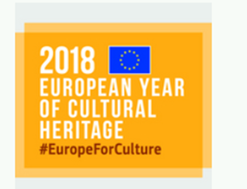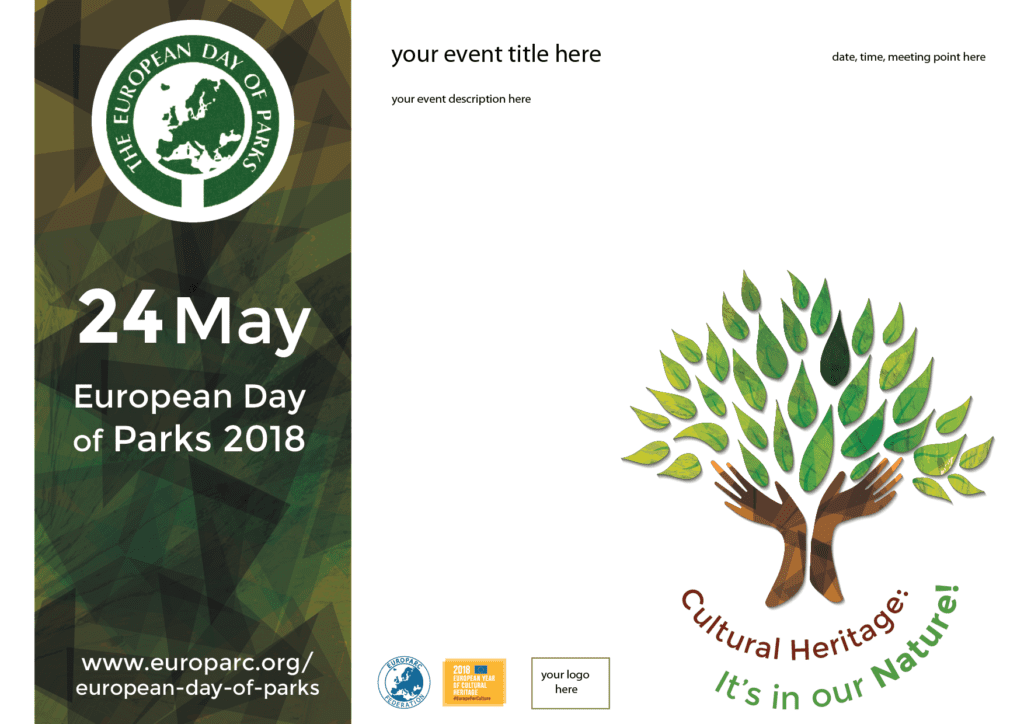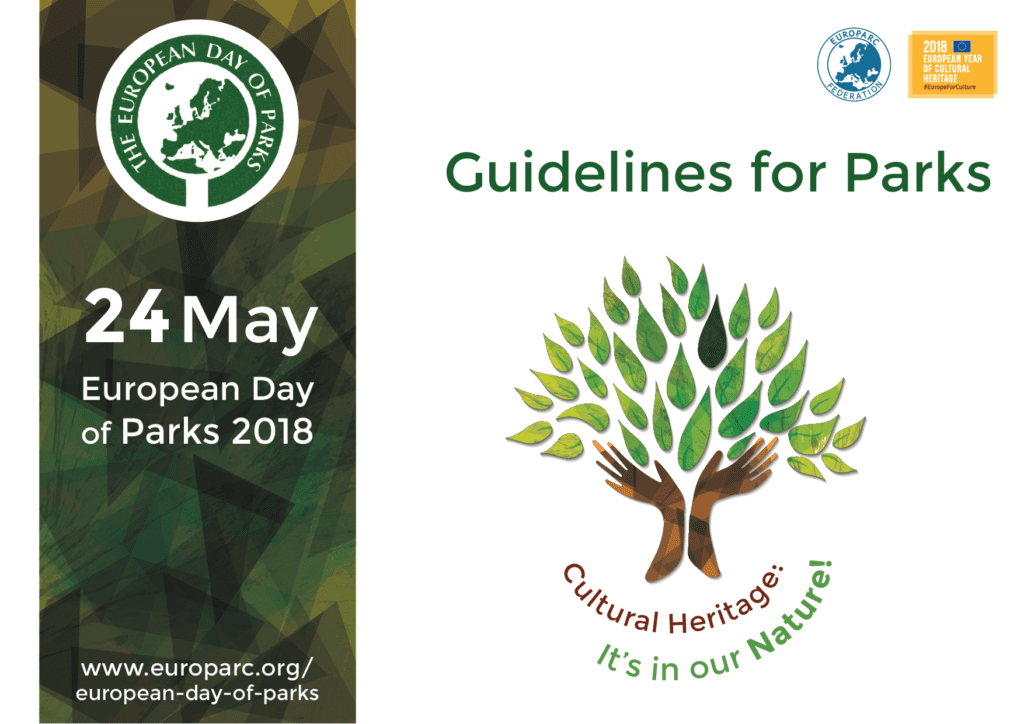European Day of Parks 2018: Cultural Heritage-It’s in Our Nature!
The European Day of Parks is a commemorative day for Protected Areas across Europe that was launched in 1999 by the EUROPARC Federation to celebrate Protected Areas throughout Europe. It celebrates the creation of the 1st National Parks in Europe – a set of nine parks created in Sweden in 1909.
2018: Call for a joint celebration with the European Year of Cultural Heritage
Cultural Identity is rooted in the connection to the land. Look at your local traditions, at the stories your landscape tells, at the crafts, literature , and art, at the architectonic styles, or even at the food you eat… Cultural Heritage is, indeed, in our Nature!

Our Heritage: where the
past meets the future
is the key message of the 2018
European Year of Cultural Heritage
May this European Day of Parks in the European Year of Cultural Heritage be an opportunity for our Protected Areas to:
- connect people to their land, bridging natural heritage with their cultural identity;
- understand the past history of our land, and build a future that respects our heritage in all its diversity
We’ve created a short manual to help you developing your activities and events!
Download the Guidelines for Parks
Promotion Tools in your language!
Download the official poster and web banners to promote your event. This year, it’s also available a poster to personalize with your activities and a colouring version. All in your language!
An automatic download will start when you click over your language. NOTE: All images are in .png format, so you can easily edit them in paint or word. If you need the editable file (.ai or .eps) or a higher resolution please contact us to edop @ europarc.org.

There are 2 official posters of the European Day of Parks. in this version, you can also add in the details of your events.
Albanian | Bosnian | Bulgarian | Catalan | Croatian | Czech | Dutch | English | Estonian | French | German | Greek | Hungarian | Italian | Latvian | Lithuanian | Polish | Portuguese | Romanian | Serbian | Slovenian | Spanish
If you are not interested in using the official posters, you can also download the logo and use it in your activities.
Haven’t found tools in your language?
No problem! Just have to send us to edop @ europarc.org the translation of “European Day of Parks” and “Cultural Heritage: It’s in our Nature” and we will be delighted to produce tools in your language!
About the European Day of Parks
Imagine a day when all Parks and Protected Areas come together across Europe, celebrate their successes and declare the value and benefits of Europe’s Protected Areas to communities, decision-makers and the wider public. Well, it is EUROPARC’s European Day of Parks!
Every year European Day of Parks takes place on and around 24th of May. It aims to bring people closer to nature and raise public awareness on the importance of the natural beauty preserved in Protected Areas and the importance of conservation and sustainable management of those places.
Check here to see the previous editions.
The 2018 EU-China Tourism Year
The Tourism Task Force of the European Parliament (Committee TRAN – TRANSPORT AND TOURISM) had a special meeting on 27 February 2018 to analyse the tourism sector’s key results and trends in the EU in 2017 and looked at its main future challenges.
MEPs exchanged views on the positive and challenging implications of the 2018 EU-China Tourism Year, officially launched in Venice, IT, in January. This year will be the occasion to develop mutual relations and initiatives in the tourism sector, and EU will be “guest of honour” in all tourism fairs in China, in order to attract more tourism flows from China to the European countries. All these initiatives will be illustrated on the website of the year https://ecty2018.org/ . Other Asia’s countries, as India, are considered the future markets where to “sell” European destinations.
Eurostat presented its latest statistical data (2016) in relation to tourism in the European Union (EU). Tourism plays an important role in the EU because of its economic and employment potential, as well as its social and environmental implications, and the tourism statistics are not only used to monitor the EU’s tourism policies but also its regional and sustainable development policies.
The data (provided by Member States) show that tourism sector resists to the economic crisis and numbers of arrivals are increasing.
Main statistical findings show that :
- One third of all the bed places in the EU-28 are concentrated in France and Italy;
- More than half (55.7 %) of the total nights spent by non-residents in the EU-28 were spent in Spain, Italy, France and the United Kingdom;
- 62% of the EU residents took part in tourism, making 1.2 million trips;
- Residents of Germany and the United Kingdom spent more than half of the total number of nights spent abroad by EU-28 residents;
- Germans were the biggest spenders on international travel.
All information about statistics are available on the Commission’s website: http://ec.europa.eu/eurostat/statistics-explained/index.php/Tourism_statistics
Download the data from 2017 here.
The debate among the MEPs celebrate the positive results but also mention the need to well manage the flows.
Future plans for Tourism in Europe
The European Comission DG Growth presented its future plans for the tourism sector, connected with the 2018 European Year of Culture and several initiatives in collaboration with Unesco, the future initiative ‘European capital of smart tourism’ , the COSME program to support creative tourism, youth and women in tourism enterprises, the need of engagement on security and information of travellers, and to increase innovation and digitalisation in the sector.
MEPs met also Mr. Zurab Pololikashvili, the new Secretary-General of the World Tourism Organization (UNWTO) since 1 January 2018 after being elected by the 22nd Session of UNWTO General Assembly.
Natura 2000 European Citizen’s Award – Vote now!
The finalists for the 2018 European Natura 2000 Award are out!
Vote now for your favourite!
The European Commission’s Natura 2000 Award recognises the time, dedication and efforts Europeans invested in nature protection within the Natura 2000 network of protected areas. The Award aims to raise awareness about Natura 2000 and the role it plays for safeguarding our natural heritage and in promoting social and economic wellbeing.
Twenty-five finalists have been selected out of seventy-five eligible applications from across the EU. The selected finalists are from Austria, Belgium, Bulgaria, Czech Republic, Denmark, Estonia, France, Germany, Greece, Hungary, Ireland, Luxemburg, Poland, Portugal, Spain and United Kingdom. They include several cross-border projects, involving also Turkey, and an EU-wide project.
Reacting to the announcement, Karmenu Vella, EU Commissioner for the Environment, Maritime Affairs and Fisheries said:
“I am delighted to see so many excellent achievements in protecting our European natural heritage. They clearly demonstrate the value that nature provides to Europe’s economy and how our nature is at the heart of our culture. Vote now and give these remarkable achievements the recognition they deserve!”
The finalists in five categories – Conservation, Socio-Economic Benefits, Communication, Reconciling Interests/Perceptions, and Cross-Border Cooperation and Networking – will now be assessed by an independent jury. Everyone is invited to vote for his or her favourite finalist to win the European Citizens’ Award. Online voting closes on 22 April 2018. The winners will be announced at a ceremony hosted by Commissioner Vella in Brussels on Thursday 17 May 2018. The event is open to the press and the public. Please register online if you wish to attend.
The ceremony can also be watched online on the Natura 2000 website.
Media contact: natura2000awards@tipik.eu
Background of the European Natura 2000 Awards
Natura 2000 is the centrepiece of the EU’s nature and biodiversity policy. Established under the EU’s Birds Directive and Habitats Directive, it is an EU-wide network of over 27 000 terrestrial and marine sites, covering more than 18 % of land area and 7% of the surrounding seas.
The aim of the network is to assure the long-term survival of Europe’s most valuable and threatened species and habitats. Well-functioning ecosystems provide benefits for human health, society and the economy. Natura 2000 provides an array of environmental advantages, while also serving a number of vital social and economic functions. In the EU, around 4.4 million jobs are directly dependent on healthy ecosystems, and a significant proportion of these are situated within Natura 2000 sites. In addition, the financial benefits that flow from the network itself are estimated to be in the range of EUR 200 to EUR 300 billion per year.
The European Commission’s Action Plan for Nature, People and the Economy aims to improve the implementation of Natura 2000 and boost its contribution towards reaching the EU’s biodiversity targets for 2020.
The European Parks Academy 2018 is open for registration!
European Parks Academy
The European Parks Academy 2018 (EPA) is a new international training format that addresses the increasing capacity needs for planning and effectively managing protected areas. The unique cooperation between IUCN´s World Commission on Protected Areas (WCPA), the research institution E.C.O. and the Alpen-Adria University Klagenfurt resulted in well-designed and targeted training modules hold by renown experts.
The summer academy takes place from 16th to 28th July 2018 in Klagenfurt/Austria next to the attractive lakeside of the Wörthersee. The first week is dedicated to the topic Communication & Participation, while the second week hosts two modules in parallel – Ecological Monitoring and Management of World Heritage Sites (see dates & structure below).
| Mon, 16.7. |
Tue, 17.7. | Wed, 18.7. | Thu, 19.7 | Fri -Sat 20.-21.7. |
Sun, 22.7. |
Mon, 23.7. |
Tue, 24.7. | Wed, 25.7. | Thu, 26.7. | Fri – Sat 27.-28.7. |
| Module A | Module B & C (selective, in parallel) | |||||||||
|
Panel & Posters |
Seminar A: |
Excursion: |
Break
|
Panel & Posters |
Seminar B:
|
Excursions: |
||||
One highlight of this year´s Academy is the World Heritage Conference on the 23rd July. Representatives of UNESCO and IUCN will join the Academy for one day to discuss the coordination & management of Natural World Heritage Sites by the example of the serial property “The Ancient and Primeval Beech Forests of the Carpathians and Other Regions of Europe”.
Learn, exchange, enjoy!
In the seminars, you will get inputs and coaching from high-profile lecturers, work in a personalized environment and reflect on international protected area standards & procedures. There will be lots of space for exchange & intercultural learning, for reflection and coaching on your working context & challenges
The first week (Module A) is dedicated to strategic approaches for communication and visibility of parks. Participants will work on the communication of visions & values, on the development of a recognizable image (“brand”), on attractive participatory approaches and on options for reaching a broader audience
Module B, in the second week, provides guidance and training on the design of resource-saving and goal-oriented monitoring systems. Insights into modern technologies for data collection and management will be embedded into a step-by-step approach for developing effective ecological monitoring systems.
With the module on Natural World Heritage Sites (Module C), the European Parks Academy responds to the high amount of recent World Heritage designations and the need of developing an understanding for the UNESCO World Heritage standards and procedures along the 3 phases – nomination, management and evaluation of WH sites.
Modul A and B respectively start with a panel & poster session, where you will share your own experiences and working background, meet your colleagues of the seminar and get inspired by the stories of local scientists, experts and practitioners.
Join this unique event and carry home impulses and concrete guidance for your engagement in conservation and protected area management!
Further information and registration: https://e-c-o.at/epa.html
See also: IUCN News on the European Parks Academy 2017
Contacts:
Andrej Sovinc, IUCN´s WCPA: wcpa.sovinc@gmail.com
Alexandra Joseph, E.C.O. Institute of Ecology: epa@e-c-o.at

